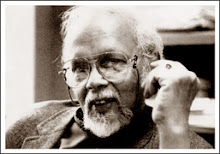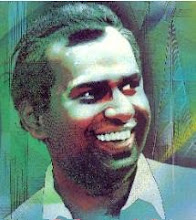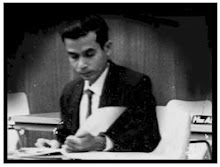Author: E. M. G. Edirisinghe
Source: Daily News
Date: 18/08/2004
Jude Srimal, the actor-turned theatre manager has completed 25 years service to the stage. To mark the event he has organized a festival of Sinhala theatre titled Thun Kal Dekma at the Elphinstone Theatre, Colombo.
Question: Is there any special meaning to your festival being called Thunkal Dekma and what significance do you attach to it?
Answer: I mean, firstly the three decades of Sinhala theatre of the 70s to 90s, and it also reflects my active full time involvement in three areas in theatre, production, management and organization. My intention is to take my contribution to theatre in this area forward with greater vigour and dedication.
 |
| Kaputu Bo |
This festival, I hope, will encourage me to commit myself more to the cause of theatre. I intend to show that theatre management and theatre organization are an integral part of the theatre culture.
Q: Can you recall your entry to theatre in 1979?
A: In response to a newspaper advertisement, I applied for selection for a play to be produced by the German Cultural Centre. I was one of the 25 selected.
Along with me Jayantha Chandrasiri, Kamal Addararachchi and Sriyantha Mendis too were selected to act in the play Ane Ablick directed by Nobert J. Myre. Apart from acting in the play, I was selected to manage the stage too, which I liked more than acting.
 |
| Dhawala Bheeshana |
Q: In theatre yours is a unique role. You perform well in the triple theatre area of production, management and organization. How do you cope up with the pressure of demand of such a commitment?
A: My first preference was acting; but, before long I found myself more a theatre organizer than a theatre actor. There is tough competition for a place in the cast whereas theatre organization and management were almost a neglected area. Without a proper organization plays cannot be effectively taken to the people.
This we noted, particularly in 1983 when the atmosphere was such that theatre almost did standstill. I brought to stage some plays at outstation venues like Wennappuwa, Chilaw, Galle, Awissawella and Baddegama in 1983.
Commitment
It was due to my personal commitment that I was able to revive theatre during this period of turmoil. It proved that without management and organization, stage plays cannot be taken to the people. Incidentally my long dedicated service to theatre was recognized by the state when I was honoured with the award for the best organizer of drama at the State Drama Festival held in 2001.
 |
| Madhura Javanika |
Q: What were the stage plays you produced?
A: Among my eight productions were the plays such as Padada Asapuwa, Varenthu, Kaputu Bo, Suba saha Yasa, Sekkuwa and Kalu Sudu saha Warna.
Q: The 70s and the 80s are considered the golden era of Sinhala theatre. What have you got to say about this?
A: It was the time when we witnessed heavy stage productions. The cast was huge, the sets and stage were large and dedication of the artistes was much greater. Moreover, the plays carried a complex and heavier theme adding diversity to the play.
Then, there were workshop productions which were really absorbing. Today, we have hardly such plays. However, we have an excess of workshops. We do not need so many workshops.
 |
| Jude Srimal: Tomorrow will be better... |
At that time, seeing a play was a joy and in contrast, today most of them are mental tormentors which the majority of the theatregoers either refuse to patronise or fail to understand or enjoy. How the audience then enjoyed such good plays as Gajaman Puwatha, Angara Ganga Gala Basee, Suba Saha Yasa and Ananda Javanika I do still remember.
Sometimes all the tickets were sold out, and we had to even sell the counterfoils to meet the clamour for tickets. And, it looks as if we have forgotten the ancient motto "from joy to wisdom" for it to fall from grace today. Repeat crowds are a rarity today, and eventually theatre suffers.
Deterioration
Q: How do you differentiate between the theatregoers then and now?
 |
| Sihina Horu Aran |
A: Certainly there is a decline in spectator interest in theatre. I believe when there is a general deterioration in cultural and social activity, art is the first casualty. Primarily the dramatists themselves are responsible for this cultural decline in theatre. Politicians are answerable for the decline in political culture today.
At that time, there was a scramble for early bookings for plays, and today we have to run after the organizers. The television too, is partly responsible for this sad situation. While some people love to watch teledramas leisurely within the home atmosphere and some artistes, the youngsters in particular, make it to the stage aiming to break into television.
 |
| Maname |
They are mostly after publicity, popularity and money, and art is the least in their mind.
Q: What difference do you draw between the theatre artistes then and now?
A: The artistes then were punctual and good students of art, too. Their dedication was unblemished and unimaginable. They did not hesitate even to paste postes. Most of the youngsters today are impatiently waiting for a call for a role in a teledrama.
The dramatists were learned in the theatre and were knowledgeable too. There was social acceptance for them and were eager to learn more and more. You cannot say the same thing of the today's artistes.
 |
| Suba Saha Yasa |
Q: What is your opinion about the young dramatists today?
A: Among the top young directors Buddhika Damayantha, Priyankara Rathnayake and Rajitha Dissanayake come first to my mind. They are among the very few who are dedicated to theatre today. They should together with veterans in the field, take Sinhala theatre into new heights.
Once Prof. Sucharitha Gamlath said no tree could grow if the root was cut. Many of today's dramatists are subjective and live under an euphoria of an over-estimated ego after writing off the past.
Difficulties
Q: What difficulties have you faced in organizing plays in the outstations?
 |
| Elova Gihin Melova Ava |
A: There are officials in some local bodies, who do not know that stage plays are exempt from entertainment tax. I have to produce copies of the gazette in proof, and even then some of them do not understand the gazette notification.
Some clerks who issue the receipt of exemption, as if they have done a favour, request us whether they too, could participate in the lighting of the traditional oil-lamp. We always face problems of lack of proper halls, stages curtains and other facilities like electricity. I find most of the public servants are lethargic, indifferent and inefficient.
Q: Kaputu Bo is a 1969 production. What made you to give a helping hand to R.R. Samarakoon to revive it?
A: I always love our veteran theatre artistes. Incidentally when the Kaputu Bo script was given to me, I found that this play is relevant even to today's social environment. It has a universal appeal and I decided to sponsor its production and already I have over 50 bookings.
Q: How do you organize plays in the outstations?
A: With 25 years of experience in theatre management and organization, I have established a network of organizers in the outstations. They know that I organize only good plays. So they have faith in me that I do not promote box-office failures. I do everything to make a play a financial success.
Q: What makes you to organize both new and old plays on stage?
A: Generally theatregoers love old plays as well as new ones. We must understand them and provide them with plays they enjoy. However, older plays still draw bigger crowds than the new plays. Lionel Wendt is one theatre where modern plays are not quite welcome. It is oral publicity that matters most in drawing crowds to theatre. Only the enlightened viewers are guided by reviews.
Difference
Q: Is there an evident difference between the urban and rural theatregoers?
A: Whether it is rural or urban, generally the audience is the same.
All of them enjoy theatre. However, in understanding drama the urban theatregoer is ahead of his rural counterpart. The rural folk prefer light amusement to heavy theatrical exercises.
Q: What have you got to say to the present day dramatists?
A: They should not only show an interest to write and produce drama but also in the same stride should show a similar interest to take them to the people. In this context some of them call me drama-mudalali and I do not disagree with them.
Q: How do you see the future of Sinhala theatre?
A: Certainly tomorrow will be better than today, but will never be better than yesterday.




































No comments:
Post a Comment